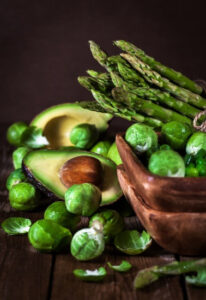
Anxiety affects millions of people worldwide, and while therapy and medication can be effective treatments, diet also plays a crucial role in managing symptoms. Certain foods have been shown to support brain function, promote relaxation, and help reduce anxiety. This article explores the best foods for easing anxiety and how they contribute to mental well-being.
Understanding the Link Between Diet and Anxiety
The gut and brain are closely connected through the gut-brain axis. Nutrients from food influence neurotransmitters, such as serotonin and dopamine, which regulate mood and stress levels. A diet rich in essential nutrients can enhance mental resilience, while processed and unhealthy foods can exacerbate anxiety symptoms.
1. Fatty Fish
Fatty fish like salmon, mackerel, and sardines are excellent sources of omega-3 fatty acids, which have been linked to reduced anxiety.
- How It Helps: Omega-3s support brain function and reduce inflammation, which can contribute to anxiety.
- How to Include It: Eat grilled or baked salmon twice a week or add canned sardines to salads and sandwiches.
2. Dark Chocolate
Dark chocolate is rich in antioxidants, particularly flavonoids, which can enhance brain function and improve mood.
- How It Helps: Flavonoids help increase blood flow to the brain, reducing stress hormones and promoting calmness.
- How to Include It: Choose dark chocolate with at least 70% cocoa and consume a small piece daily.
3. Yogurt and Fermented Foods
Fermented foods like yogurt, kimchi, sauerkraut, and kefir contain probiotics that support gut health and influence mental well-being.
- How It Helps: Probiotics improve gut microbiome balance, which is linked to lower levels of anxiety.
- How to Include It: Eat plain yogurt with fruits or add fermented foods to your meals.
4. Green Tea
Green tea contains the amino acid L-theanine, which promotes relaxation and reduces stress.
- How It Helps: L-theanine increases levels of serotonin and dopamine, contributing to a sense of calm.
- How to Include It: Drink one to two cups of green tea daily to enjoy its anxiety-reducing effects.
5. Nuts and Seeds
Nuts like almonds, walnuts, and seeds like flaxseeds and chia seeds provide essential nutrients for mental health.
- How It Helps: Magnesium, zinc, and healthy fats in nuts and seeds reduce stress and support brain function.
- How to Include It: Snack on a handful of nuts daily or add seeds to smoothies and salads.
6. Leafy Greens
Leafy greens like spinach, kale, and Swiss chard are packed with vitamins and minerals that help combat anxiety.
- How It Helps: Magnesium in greens supports relaxation, and folate helps regulate mood-enhancing neurotransmitters.
- How to Include It: Add greens to salads, smoothies, or soups for a nutrient boost.
7. Berries
Berries such as blueberries, strawberries, and blackberries contain high levels of antioxidants and vitamin C.
- How It Helps: These nutrients protect against oxidative stress, which has been linked to anxiety disorders.
- How to Include It: Eat fresh berries as a snack or blend them into yogurt or oatmeal.
8. Whole Grains
Whole grains like oats, quinoa, and brown rice provide slow-releasing carbohydrates that stabilize blood sugar and mood.
- How It Helps: Complex carbohydrates help increase serotonin production, reducing feelings of anxiety.
- How to Include It: Choose whole grain bread, pasta, or rice as part of your meals.
9. Avocados
Avocados are rich in B vitamins and healthy fats that support nervous system health.
- How It Helps: B vitamins play a crucial role in neurotransmitter function, reducing anxiety symptoms.
- How to Include It: Add avocado to salads, toast, or smoothies.
10. Turmeric
Turmeric contains curcumin, a powerful anti-inflammatory compound that supports brain health.
- How It Helps: Curcumin reduces inflammation and oxidative stress, which contribute to anxiety.
- How to Include It: Add turmeric to soups, curries, or golden milk.
11. Chamomile Tea
Chamomile tea is widely known for its calming effects and is often used to promote relaxation.
- How It Helps: Chamomile contains antioxidants that interact with neurotransmitters to reduce anxiety symptoms.
- How to Include It: Drink a cup of chamomile tea before bed to aid relaxation and sleep.
12. Bananas
Bananas are a great source of potassium and vitamin B6, both of which support brain function.
- How It Helps: Vitamin B6 helps produce serotonin, which regulates mood.
- How to Include It: Eat bananas as a snack or add them to oatmeal and smoothies.
13. Eggs
Eggs contain choline, a nutrient that supports brain function and reduces stress levels.
- How It Helps: Choline helps produce neurotransmitters that promote relaxation.
- How to Include It: Eat eggs boiled, scrambled, or in omelets for a protein-packed meal.
14. Sweet Potatoes
Sweet potatoes are high in fiber and complex carbohydrates, which stabilize blood sugar and mood.
- How It Helps: The steady release of energy prevents mood swings and anxiety spikes.
- How to Include It: Bake or mash sweet potatoes as a nutritious side dish.
15. Oranges and Citrus Fruits
Citrus fruits like oranges, lemons, and grapefruits are rich in vitamin C, which helps reduce stress hormones.
- How It Helps: Vitamin C lowers cortisol levels, reducing anxiety and boosting immunity.
- How to Include It: Eat citrus fruits fresh or drink their juice.

Source https://www.health.harvard.edu/
Eating a nutrient-rich diet can be a natural way to support mental health and reduce anxiety symptoms. By incorporating foods like fatty fish, leafy greens, nuts, and probiotics into your daily meals, you can improve brain function and promote relaxation. Making mindful dietary choices can complement other anxiety management strategies, leading to better overall well-being.

Leave a Reply